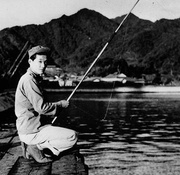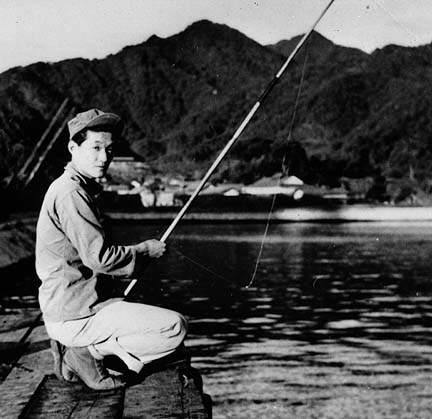
Japanese American Military Experience Database

Tomoji "Tom" Horiuchi
Gender
Male
Birth date
1929-5-15
Place of birth
Captain Cook, Kona HI, U.S.A.
Inducted
1947-9-6, Schofield Barracks HI
Enlistment type
Volunteer
Service branch
Army
Service type
War,peacetime
Unit type
Combat
Units served
356th Headquarters Intelligence Detachment; Hawaiian Infantry Training Center; G-2, Headquarters, United States Army, Pacific; The Infantry School; 8th Infantry Division; Militrary Assistant Advisory Group (MAAG); Assistant Chief of Staff, G-2
Military specialty
Army Intelligence/Infantry--SEE BIOGRAPHIC RESOURCE FILE
Stationed
USA - Schofield Barracks, HI, Fort Benning, GA, Fort DeRussey, HI; Tokyo, Japan; Korea; Germany; Kien Thanh, Viet Nam
Separated
Fort Ord CA
Unit responsibility
356th Hqs Intel Det. - Gathering of strategic, tactical, economical and industrial information. 531st Mil Intel Plat. - Interpretor and interrogate POWS for tactical intelligence information. 8th Infantry Division - As part of NATO Forces, we established defensive lines to repel Eastern Block Forces from penetrating NATO lines. The Infantry School - To teach basic and advance infantry training to officer candidates (OCS), basic infantry officers course (BIOC) and advance career course.
Personal responsibility
January 1948 to July 1950 (Japan) - Directly involved in the interrogation of prisoners of war to gather information of strategic, tactical, industrial and economic value. July 1950 to July 1951 (Korea) - Interpretor and interrogation of prisoners of war for immediate tactical value. November 1952 to April 1954 (Infantry Training Center) - As a cadre I was responsible for training recruits to become soldiers and combat ready. April 1958 to March 1956 (G-2 Div) - As an intelligence analyst, I was responsible for extracting various information from classified and unclassified documents and interpret the nature of the information. August 1956 to February 1958 (The Infantry School) - Tactical and executive officer for the Advanced Non-Commissioned Officers Academy, Fort Benning, GA. I supervised four senior non-commissioned officers who acted as tactical officers and wrote observation reports on students. I reviewed all the reports daily to insure the report included the students' conduct, performance, attitude, cleanliness and dress. On a weekly basis, I reviewed all reports to determine which student was failing and to take appropriate action and assist the student. If misconduct was involved he was recommended for removal from the course. February 1958 to April 1961 (Germany) - As a rifle and weapons platoon commander, I was responsible for the training, welfare and discipline of the men assigned to my platoon. As the executive officer, I was responsible for the administrative functions of the company. January 1962 to July 1963 (Fort Ord, CA) - As the commanding officer of a basic company, I had complete responsibility for the training of the recruits to become effective soldiers and combat ready. September 1963 to April 1964 (Vietnam) - Intelligence specialist, and secretary for OPLAN 60-62, MAAG, VN. I was responsible for the compilation of intelligence information received from field advisors and recommend the chairman (Chief of Staff, Military Assistance Command) to schedule a briefing for appropriate personnel. This was a highly sensitive and classified plan. April 1964 to September 1964 (Vietnam) - Responsible for advising the battalion commander on counter - insurgency operation. Accompanied the battalion on combat operations and advised the commander as required. September 1964 to June 1967 (Fort Benning, GA) - As instructor in combat intelligence and foreign armies to the Infantry Officer Candidates (OCS) and Basic Infantry Officers (ROTC), I was responsible for insuring that these junior officers were thoroughly familiar with the proper analysis of the weather, terrain, and the enemy to produce combat intelligence. Exams were administered to test their knowledge. June 1967 to July 1968 (Fort DeRussey, Hawaii) As the commanding officer of the Armed Forces and Examining Station, I was responsible for the processing and screening of personnel entering the military for the first time in determining qualification for the armed forces. If qualified, they were sent to their basic training stations. July 1968 to September 1968 (Vietnam) - As the senior district advisor, I was primarily responsible for advising the Vietnamese district chief in counter insurgency operation. Due to lack of military training and knowledge it was difficult advising. The district chief, his staff and their families lived in the compound. My tour was terminated in two months due to being wounded. February 1969 to June 1972n (Fort Ord, CA) - I was appointed Director of Security, assistant chief of staff, G2. I was responsible for the processing and issuing of clearances to personnel required access to classified information. To collect, process, interpret, and disseminate intelligence information. Inspect every units' accountability of classified documents and storage.
Major battles (if served in a war zone)
7/50 to 7/51 in Korea, UN defensive, offensive, Chinese intervention, UN counter-offensive, Chinese Spring offensive and UN summer/fall offensive.; 9/63 to 9/64 (Vietnam); 7/69 to 9/64 (Vietnam) Coup d'etat and 1968 Tet offensive.
Awards, medals, citations (individual or unit)
Legion of Merit; Bronze Star; Purple Heart; Army Commendation Medal - 2; Combat Infantryman Badge; Expert Infantryman Badge; Ranger Arc Tab; Airborne Wing; Good Conduct Medals -2; Japan Occupation Medal; Korean Service Medal with six Battle Stars; UN Service Medal; Republic of Vietnam Campaign Medal; Reserve Officer's Medal
Living conditions
Jan 1948 to July 1950 (Japan Occupation) - we slept in wooden barracks (formerly the Japanese Naval Academy). We had hot and cold running water, three hot meals a day and no guard duty or kitchen police (KP). July 1950 to July 1961 (Europe) - Very hot summer and extremely cold winter. We slept in empty buildings, in the open, sometimes in fox-holes, but most of the time in squad tents with oil burners for heat. Meals were generally 'C'ration. Showers were taken usually about once a week. When we came to a river, we took a quick bath. February 1958 to July 1961 (Europe) - Living condition was excellent. My family and I were able to travel together. Housing was government funished. September 1963 to September 1964 (Vietnam) - The first six months, I lived in a modern hotel in Saigon. Then I lived in wooden bunker infested with rats, snake and scorpions. Vietnamese meals smelled and tasted rotten. The chicken soup was tasty, but was common to find chicken heads, feet and twenty-day old eggs (chicks with feathers). Stateside living was excellent in every way.
Most vivid memory of military experience
I was sent to Korea two weeks after North Korea invaded South Korea. Witnessing friends getting shot, getting killed and wounded has been a terrifying experience. Even today, when I close my eyes and think of Korea, I can clearly hear the screams and moaning sounds of suffering. Vietnam had been complely different from Korea. I witnessed more Vietnamese killed and wounded, but did not feel as terrifying as in Korea. I always wondered how I would react if and when I be wounded ... what my reaction be? It happened on July 21, 1968. At approximately 1:30 PM my weapon flew out of my hands as I dove for cover. Looking and searching for my weapon, my radio operator told me I was bleeding . That is when I realized that I had been wounded. My wondering was now a reality. Another vivid memory that I have is when I graduated from the Infantry Officers Candidate School and commissioned a second lieutenant in the United States Army. This was one of the happiest moment of my Army Career. Each promotion thereafter was also a great moment to my final promotion to lieutenant colonel. Another vivid memory? Yes, the Army's Ranger training course; eight weeks divided into three phases: physical training in Fort Benning, Georgia; swamp training in Florida; and mountain training in Smokey Mountains. This training is the most grueling, exhaustive, torturous in the armed forces, but the best training possible. This course is for the truly dedicated professional soldier. Unless you are totally committed to this training, you will not complete the course. The distinctive Ranger Arc Tab is highly recognized as a unique accomplishment. I thought Airborne training was tough, but compared to Ranger training, it was nothing.
Missed most whilst in the military
Japanese food - In 1956, while stationed at Fort Benning, Georgia, we ordered Japanese food items from Denver, Colorado. In Europe, it was non-existent. Other Nisei family companionship. While in Germany for three and one-half years, a Chinese couple, a Nisei couple and a Nisei bachelor were assigned to the brigade for one to two years.
Most important thing, personally, to come from military experience?
The Army has been good to my family and me. The training and discipline drilled into me when I first enlisted provided me with an attitude and tools to get the job done. It taught me responsibility, loyalty, courtesy, respect and dedication to your work. It also taught me to do outstanding work even in difficult times. I learned of personal pride. I will never do or fail to do things that would discredit myself, my family or my race. I learned this when assigned to an infantry brigade of over one thousand men. I was the only Nisei in the unit. No matter what I did or failed to do would be known to the brigade, that I ensured myself that I would be the best model soldier and it paid dividend. For my efforts, I was awarded the Army Legion of Merit and commendation medal.


